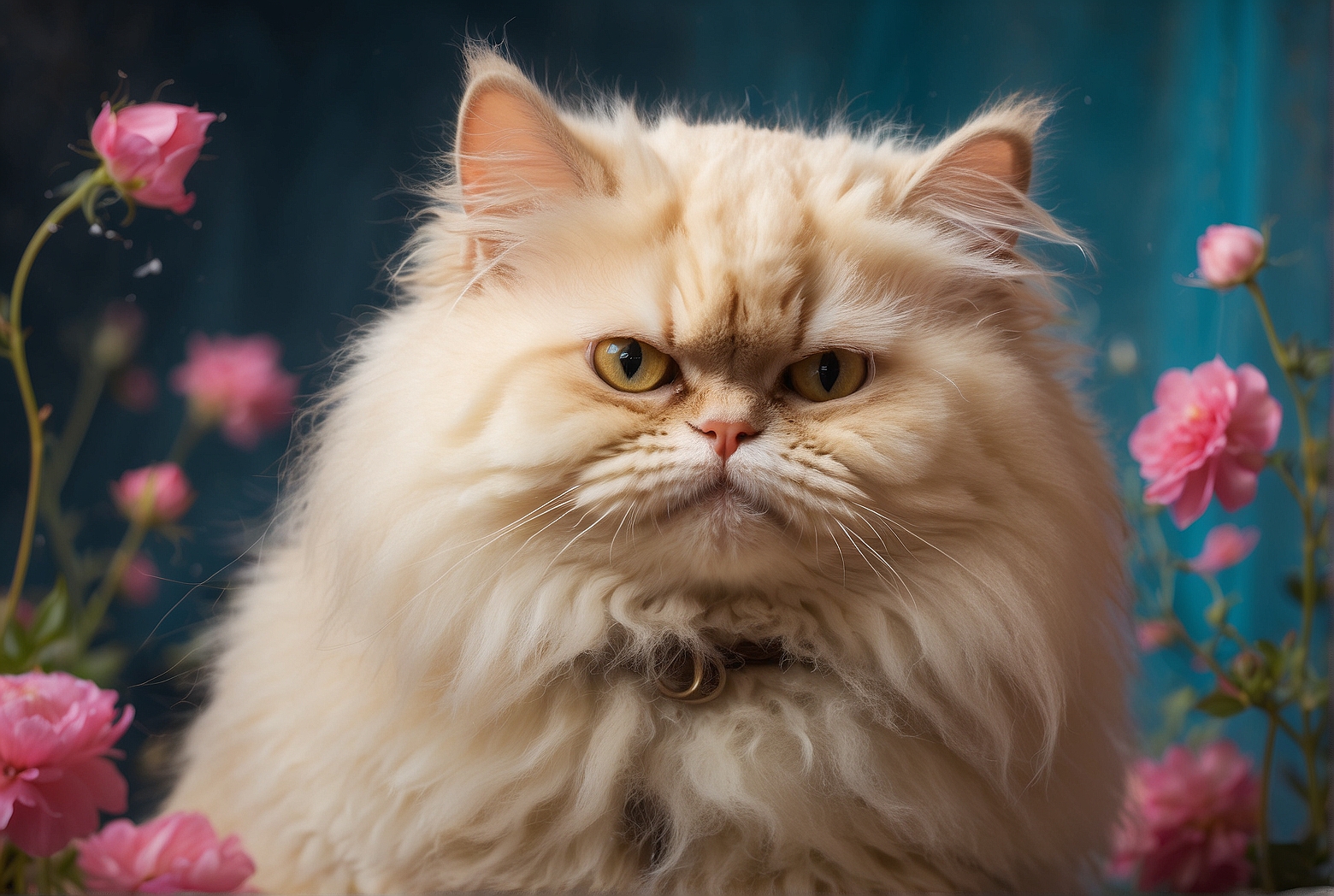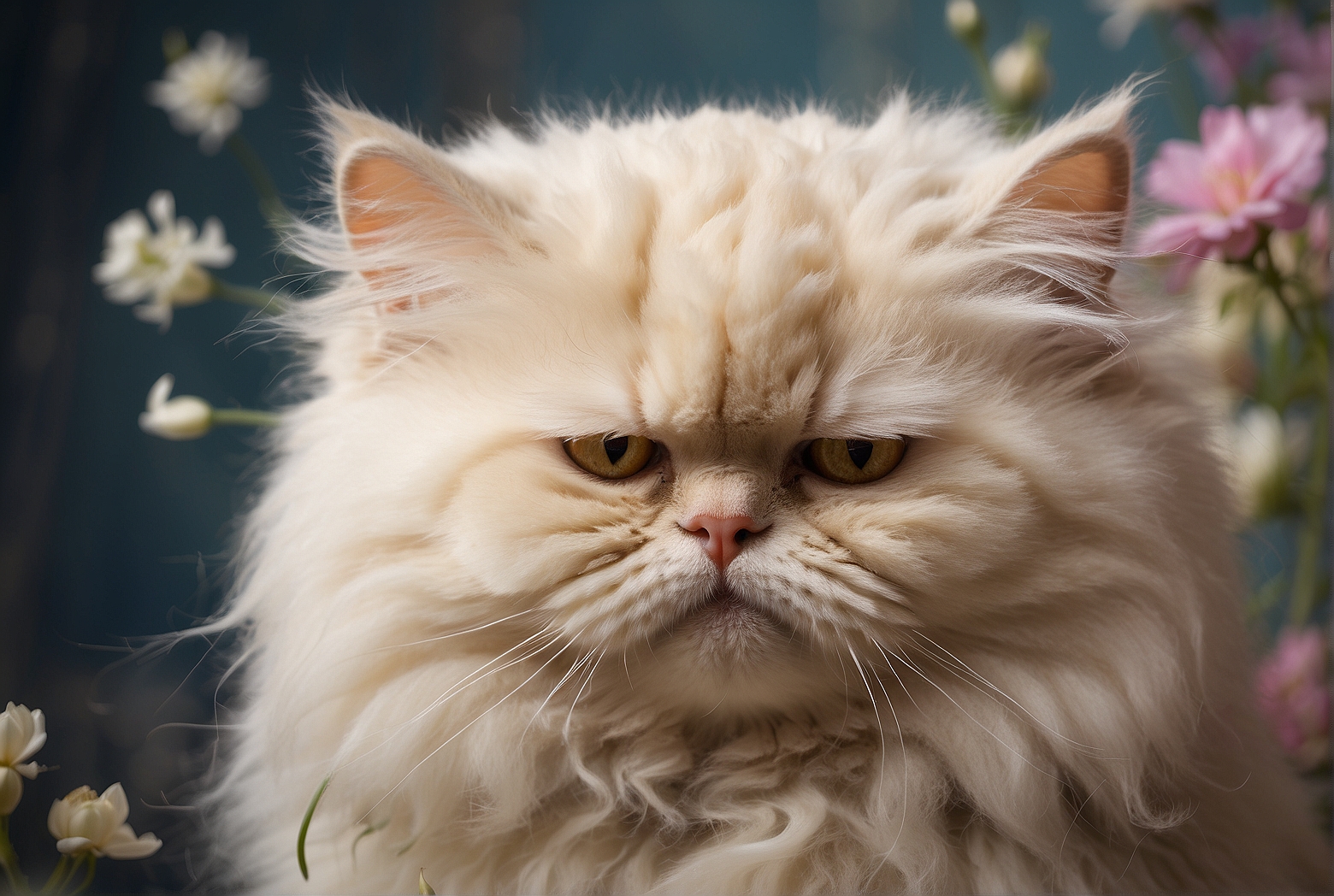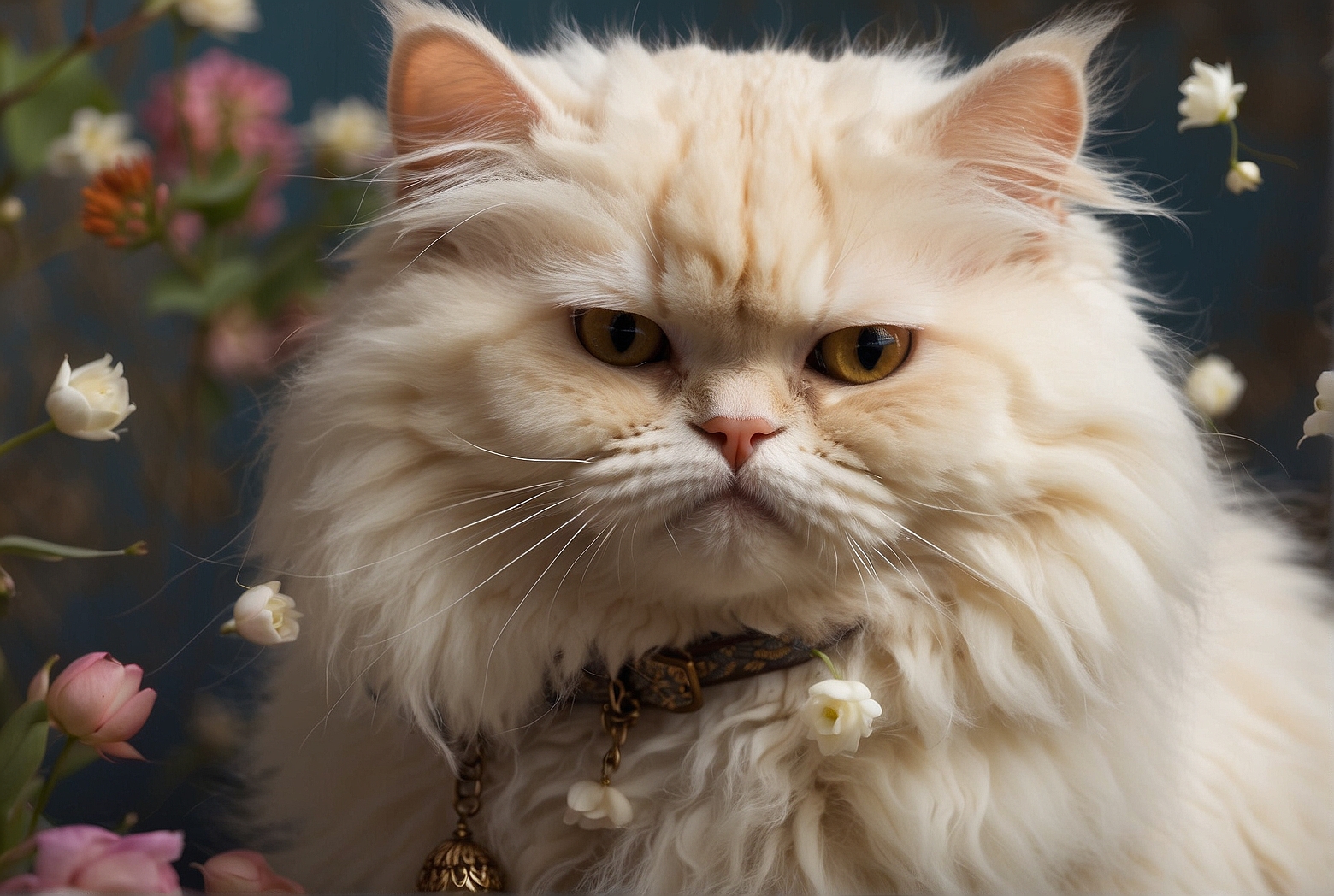If you’ve ever been in the presence of a Persian cat, you may have noticed their adorable smooshed faces and luxurious long fur. These majestic felines are known for their regal appearance and calm demeanor, but have you ever wondered if Persian cats are prone to sneezing? It turns out that sneezing is not uncommon for these beauties. In this article, we will explore why Persian cats may sneeze more often and how you can help keep them comfortable and healthy. So, if you’re a proud owner of one of these elegant creatures or simply curious about their sneezing habits, read on to find out more.
Persian Cats: An Introduction
Are you considering bringing a Persian cat into your home? These charming and elegant felines are known for their long, luxurious coats and regal appearance. With their calm and gentle demeanor, Persian cats make wonderful companions. However, one aspect that prospective owners should be aware of is that Persian cats have a tendency to sneeze more frequently than other breeds. In this article, we will delve into the causes of sneezing in Persian cats, how to identify the signs and symptoms, prevention and treatment options, and tips for living with a sneezing Persian cat.
Origin and History
Persian cats originated in Persia, now known as Iran, and have a rich history dating back several centuries. These cats were highly revered in ancient Persia and were often the pets of royals and nobles. They were admired for their beauty and grace, and their popularity soon spread to other parts of the world. Today, Persian cats are one of the most popular cat breeds worldwide, known for their distinctive flat faces, round heads, and lustrous coats.
Physical Characteristics
Known for their unique appearance, Persian cats have a distinctively round face with large, expressive eyes. Their noses are short and pushed back, which can sometimes lead to respiratory issues. Their bodies are medium to large in size, with sturdy bone structure and a muscular build. Persian cats are famous for their long, silky coats that come in a wide variety of colors and patterns, including solid, tortoiseshell, tabby, and bi-color. Their fluffy tails and furry paws add to their overall charm and elegance.
Temperament and Personality
If you’re looking for a cat that is calm, gentle, and affectionate, then a Persian cat may be the perfect choice for you. These felines have a reputation for being laid-back and easygoing, making them wonderful companions for families and individuals alike. Persian cats are known to be great with children and generally get along well with other pets. They enjoy spending quality time with their human companions, whether it’s lounging on the couch, receiving gentle strokes, or engaging in interactive play. However, it’s important to note that Persian cats can be somewhat reserved and prefer a peaceful and quiet environment.
Understanding Sneezing in Persian Cats
While sneezing is a normal physiological response in cats, Persian cats do tend to sneeze more frequently compared to other breeds. Sneezing in cats can be caused by various factors, including respiratory infections, allergies, foreign objects or irritants, environmental factors, and even poor grooming and cleaning practices. Understanding the common causes of sneezing in Persian cats is crucial for ensuring their overall health and well-being.

Common Causes of Sneezing
Respiratory infections, allergies, foreign objects or irritants, environmental factors, and grooming and cleaning can all contribute to sneezing in Persian cats. Let’s take a closer look at each of these causes:
Respiratory Infections
Respiratory infections, such as the feline herpesvirus or the feline calicivirus, are common culprits behind sneezing in Persian cats. These infections can cause inflammation of the nasal passages and result in excessive sneezing, nasal discharge, and other respiratory symptoms. It’s important to note that these infections can be highly contagious among cats, so prompt veterinary attention and appropriate treatment are essential.
Allergies
Just like humans, cats can also develop allergies that can lead to sneezing. Allergens such as pollen, dust mites, certain foods, or even certain cleaning products can trigger allergic reactions in Persian cats, resulting in sneezing, coughing, itchiness, and other symptoms. Identifying and minimizing exposure to allergens is key to managing allergies in Persian cats.
Foreign Objects or Irritants
Sometimes, sneezing in Persian cats can be a result of foreign objects getting trapped in their nasal passages. Common culprits include grass, dirt, small plant particles, or even small toys. These objects can cause irritation and lead to excessive sneezing as the cat attempts to expel them. Careful observation and prompt removal of any foreign objects are essential to alleviate the sneezing.
Environmental Factors
Environmental factors such as dust, smoke, strong odors, or changes in temperature and humidity can also trigger sneezing in Persian cats. These sensitive felines may be more susceptible to the irritants present in their surroundings. Ensuring a clean and well-ventilated living space for your cat can help reduce the frequency of sneezing episodes.
Grooming and Cleaning
Improper grooming and cleaning practices can contribute to sneezing in Persian cats. Their long, dense coats require regular brushing to prevent matting and a build-up of loose hair. When Persian cats groom themselves, they may inadvertently inhale loose hair, which can trigger sneezing. Regular grooming sessions and cleaning the cat’s living area can help minimize the amount of loose hair and reduce sneezing episodes.

Signs and Symptoms
As a responsible cat owner, it’s important to be able to identify the signs and symptoms of sneezing in Persian cats. Keep an eye out for the following indicators:
Frequent Sneezing
If your Persian cat is sneezing more frequently than usual or has sudden bursts of sneezing, it may be a sign of an underlying issue. Watch for any changes in sneezing patterns and monitor for other accompanying symptoms.
Nasal Discharge
Excessive sneezing can lead to nasal discharge in Persian cats. This may range from clear and watery to thick and colored. Pay attention to the consistency and color of the discharge, as it can be indicative of the underlying cause.
Coughing or Wheezing
Persistent coughing or wheezing can accompany sneezing in Persian cats. If you notice any unusual respiratory sounds or signs of respiratory distress, it is important to seek veterinary attention promptly.
Watery or Irritated Eyes
Sneezing can also cause watery or irritated eyes in Persian cats. If you observe excessive tearing or redness around the eyes, it may be related to the sneezing episodes.
Loss of Appetite or Weight
Sneezing can sometimes cause a loss of appetite in Persian cats. If your cat shows a decreased interest in food or experiences unexplained weight loss, it is essential to consult with a veterinarian to determine the underlying cause.
Lethargy or Decreased Activity
Excessive sneezing and respiratory issues can lead to lethargy and decreased activity levels in Persian cats. If your cat appears more sluggish or less engaged in usual activities, it may be a result of the sneezing episodes.
Prevention and Treatment
While it may not be possible to eliminate sneezing entirely in Persian cats, there are several preventive measures and treatment options available to minimize the frequency and severity of sneezing episodes. Let’s explore some effective strategies:
Regular Veterinary Check-ups
Regular visits to the veterinarian are crucial for maintaining the overall health and well-being of your Persian cat. Veterinarians can conduct thorough examinations, administer necessary vaccinations, and identify any underlying health issues that may contribute to sneezing.
Vaccinations and Boosters
Keeping your Persian cat up to date on vaccinations is essential for preventing respiratory infections that can lead to sneezing. Vaccines such as the feline herpesvirus and calicivirus vaccines are particularly important in protecting against common respiratory infections.
Maintaining Cleanliness
Maintaining cleanliness in your cat’s living area is essential for minimizing exposure to irritants and allergens. Regularly cleaning and dusting the surroundings, using pet-friendly cleaning products, and frequently changing bedding can help reduce sneezing triggers.
Proper Grooming and Hair Control
Regular grooming sessions are essential for Persian cats to prevent matting and excessive shedding. Brushing your cat’s hair daily can help remove loose hair and minimize the chances of it being inhaled, reducing the frequency of sneezing episodes.
Diet and Nutrition
A balanced and nutritious diet plays a vital role in supporting your Persian cat’s overall health, including their immune system. Ensure that your cat is fed a high-quality cat food that meets their nutritional needs. Consult with your veterinarian for specific dietary recommendations that may benefit your cat’s respiratory health.
Identifying and Minimizing Allergens
If your Persian cat has allergies, it is important to identify and minimize exposure to allergens that can trigger sneezing. This may involve making adjustments to household cleaning products, limiting outdoor exposure during peak allergen seasons, and keeping windows and doors closed to prevent the entry of pollen and other allergens.
Medications or Treatments
In some cases, veterinary intervention may be necessary to treat the underlying causes of sneezing in Persian cats. Depending on the diagnosis, your veterinarian may prescribe medications, such as antihistamines or antibiotics, or recommend specific treatments to alleviate the symptoms and promote healing.
When to See a Veterinarian
While occasional sneezing is normal in cats, there are instances when veterinary attention is crucial. Here are some signs that indicate it’s time to see a veterinarian:
Persistent or Severe Symptoms
If your Persian cat’s sneezing episodes persist for an extended period or become more severe, it is essential to consult with a veterinarian. Prolonged or severe symptoms may indicate an underlying infection or other health issues that require medical intervention.
Difficulty Breathing
If your cat exhibits difficulty breathing, such as rapid breathing, wheezing, or gasping for breath, it is considered an emergency. Seek immediate veterinary attention to ensure your cat’s airways are clear and to prevent respiratory distress.
Unusual Behavior or Distress
If your Persian cat shows signs of distress, such as frantic sneezing, pawing at their face, or excessive vocalization, it may be a result of respiratory discomfort. These signs warrant a visit to the veterinarian to evaluate and address the underlying cause.
Persistent Discharge
If your cat has persistent nasal discharge, particularly if it becomes thick, discolored, or foul-smelling, it could indicate an infection. Veterinary assessment is necessary to identify the type of infection and prescribe appropriate treatment.
Fever or High Temperature
A fever is an indication that your cat’s body is fighting off an infection or inflammation. If your Persian cat exhibits a high temperature, accompanied by sneezing and other respiratory symptoms, it is essential to seek veterinary care promptly.
Living with a Sneezing Persian Cat
Living with a sneezing Persian cat requires some adjustments to create a safe and comfortable environment for your feline friend. Here are some tips to consider:
Creating a Safe and Comfortable Environment
Set up a dedicated space for your Persian cat that is free from potential irritants and allergens. Provide a cozy bed, clean litter box, and ensure proper ventilation to minimize respiratory distress.
Regular Cleaning and Maintenance
Maintaining cleanliness in your home is crucial for minimizing irritants and allergens that can trigger sneezing. Regularly vacuuming carpets and upholstery, dusting surfaces, and keeping the living area well-ventilated can significantly reduce sneezing episodes.
Managing Allergies or Sensitivities
If your Persian cat has allergies, consult with your veterinarian to develop an appropriate management plan. This may involve dietary changes, avoiding specific allergens, or implementing allergy medications or treatments.
Reducing Exposure to Irritants
Minimize exposure to potential irritants that can cause sneezing in your Persian cat. Avoid smoking around your cat, use unscented cleaning products, and prevent access to areas where there might be strong odors or chemicals.
Proper Health Monitoring
Regularly monitor your Persian cat’s health and well-being. Keep track of sneezing episodes, any accompanying symptoms, and overall behavior. This will help you detect any changes or trends and assist in determining the effectiveness of preventive measures and treatments.
Tips for Allergies and Asthma Sufferers
If you or someone in your household suffers from allergies or asthma, living with a sneezing Persian cat requires some additional considerations. Here are a few tips to help minimize allergic reactions:
Consulting with an Allergist
If you or a family member have known allergies or asthma, consult with an allergist to determine the specific triggers. They can provide valuable guidance on managing allergies and reducing exposure to allergens.
Air Purifiers and Filters
Investing in high-quality air purifiers with HEPA filters can help remove allergens, pollutants, and fine particles from the air, promoting cleaner air quality and reducing the risk of allergic reactions.
Reducing Carpet or Upholstery
Consider minimizing the amount of carpeting and upholstery in your home, as these materials can trap dander and other allergens. Opt for hardwood or tile flooring, washable furniture covers, and regularly clean or replace air filters.
Using Hypoallergenic Products
When it comes to cleaning the house or grooming your Persian cat, opt for hypoallergenic products. These are specifically designed to minimize allergenic triggers and can be more suitable for individuals with allergies or sensitivities.
Washing Hands and Avoiding Touching Face
Ensure frequent handwashing, especially after interacting with your Persian cat, handling their belongings, or cleaning their litter box. Avoid touching your face, as it can transfer allergens to your eyes, nose, and mouth.
Frequently Asked Questions
Are you curious to learn more about sneezing in Persian cats? Here are some commonly asked questions and their answers:
Are Persian cats more prone to sneezing?
Yes, Persian cats are more prone to sneezing compared to other cat breeds. Their distinctive facial structure and long fur can contribute to increased nasopharyngeal irritations, leading to sneezing.
Can sneezing in Persian cats be seasonal?
Sneezing in Persian cats can be triggered by seasonal allergies to pollen or other environmental factors. In some cases, sneezing may occur predominantly during certain times of the year.
Can certain foods trigger sneezing?
Yes, certain foods can trigger allergies in Persian cats, resulting in sneezing. Common potential food allergens for cats include fish, dairy products, and specific proteins found in certain cat food formulations.
Is sneezing in Persian cats contagious?
If the sneezing in a Persian cat is caused by a respiratory infection, such as the feline herpesvirus or calicivirus, it can be contagious among other cats. Prompt veterinary attention and appropriate quarantine measures are crucial in such cases.
What are the long-term effects of frequent sneezing?
Frequent sneezing, if left untreated or if the underlying cause is not addressed, can lead to chronic respiratory issues and compromised overall health in Persian cats. It is important to identify and manage causing factors to ensure the well-being of your cat.
Conclusion
Sneezing in Persian cats, while more common than in other breeds, can be managed with proper understanding, prevention, and treatment. By being attentive to your cat’s health, providing a safe and comfortable environment, and consulting with a veterinarian when needed, you can ensure that your Persian cat enjoys a healthy and happy life. With the right care and attention, your sneezing Persian cat can continue to charm you with their regal beauty and gentle nature for many years to come.
